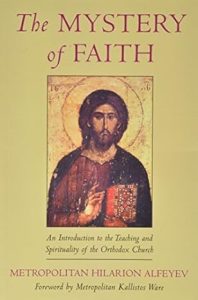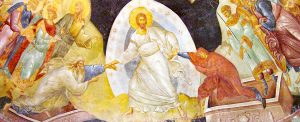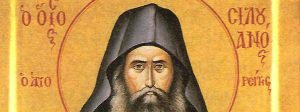Met. Hilarion (Alfeyev) writes:
For an Orthodox Christian, notions of Hell and eternal torments are inseparably linked with the mystery that is disclosed in the liturgical services of Holy Week and Easter, the mystery of Christ’s descent into Hell and His liberation of those who were held there under the tyranny of evil and death.
The Church teaches that, after His death on the Cross, Christ descended into the abyss in order to annihilate Hell and death, and destroy the horrendous kingdom of the Devil. Just as Christ had sanctified the Jordan, which was filled with human sin, by descending into its waters, by descending into Hell He illumined it entirely with the light of His presence.
Unable to tolerate this holy invasion, Hell surrendered: ‘Today Hell groans and cries aloud: It had been better for me, had I not accepted Mary’s Son, for He has come to me and destroyed my power; He has shattered the gates of brass, and as God He has raised up the souls that once I held’… In the words of St John Chrysostom, ‘Hell was embittered when it met Thee face to face below. It was embittered, for it was rendered void. It was embittered, for it was mocked. It was embittered, for it was slain. It was embittered, for it was despoiled. It was embittered, for it was fettered’.

Or read online at Orthodox Europe.
This does not mean that in the wake of Christ’s descent into it, Hell no longer exists. It does exist but is already sentenced to death.
Paradise is not a place, it is rather a state of the soul. Just as Hell is a suffering on account of the impossibility to love, Paradise is bliss that derives from the abundance of love and light. He who has been united to Christ participates completely and integrally in Paradise. The Greek word paradeisos signifies both the garden of Eden, where primordial man was placed, and the age to come, where those people who have been redeemed and saved by Christ taste eternal blessing. It can also be applied to the final stage of human history, when all creation will be transformed, and God will be ‘all in all’. The blessing of Paradise is also called in Christian tradition ‘the Kingdom of heaven’, ‘the life of the age to come’, ‘the eighth day’, ‘a new heaven’, ‘the heavenly Jerusalem’.






